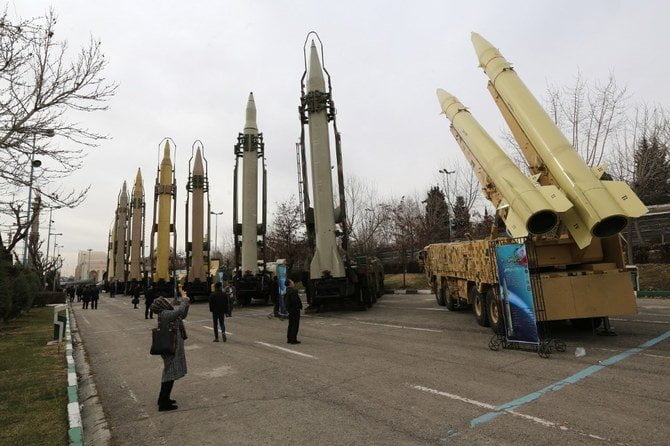
Open season on weapons sales to Iran as UN embargo expires
 The end on Sunday of a UN embargo on selling conventional weapons to Iran is “a critical threat to regional and international stability,” analysts told Arab News.
The end on Sunday of a UN embargo on selling conventional weapons to Iran is “a critical threat to regional and international stability,” analysts told Arab News.
The arms ban expired under the terms of the UN resolution that confirmed the Joint Comprehensive Plan of Action, the 2015 agreement between Tehran and world powers to curb Iran’s nuclear program in exchange for an easing of sanctions.
Iran can now buy weapons from Russia, China and elsewhere, and Tehran claims the expiry of the embargo is a diplomatic victory over the US.
Nevertheless, US Secretary of State Mike Pompeo insisted on Sunday that arms sales to Iran would still breach UN resolutions and result in sanctions. “The US is prepared to use its domestic authorities to sanction any individual or entity that materially contributes to the supply, sale, or transfer of conventional arms to or from Iran,” Pompeo said.
“Every nation that seeks peace and stability in the Middle East and supports the fight against terrorism should refrain from any arms transactions with Iran.
“For the past 10 years, countries have refrained from selling weapons to Iran under various UN measures. Any country that now challenges this prohibition will be very clearly choosing to fuel conflict and tension over promoting peace and security.”
The Iranian-American Harvard scholar Dr. Majid Rafizadeh told Arab News: “The lifting of Iran’s arms embargo is a critical threat to regional and international stability. Allowing the world’s worst state sponsor of terrorism to have an unlimited supply chain of conventional weapons may sadly go down in history as one of the most dangerous acts against world peace.
“The beneficiaries are the Islamic Revolutionary Guard Corps, its proxies and militia groups across the region. Sophisticated weapons could fall into the hand of the Syrian dictator Bashar Assad and Iran’s terror and militia groups such as the Houthis, Hezbollah, Hamas, and Iran-backed armed factions in Iraq.”
Security analyst Dr. Theodore Karasik said Iran primarily sought technical data from other countries in order to build up its domestic arms manufacturing capacity.
“Tehran’s culture of weapons engineering and reverse engineering means possible purchases of small weapons such as the Kornet anti-tank missile from Russia, and components such as Chinese optical jammers against drone attacks,” said Karasik, senior adviser to Gulf State Analytics in Washington, D.C.
“Iran also seeks off-the-shelf systems such as the Russian S-400 air defense and the Bastion coastal defense system. China will benefit too. It is thought that Iran will purchase C-802 anti-ship cruise missiles and possiblyChinese naval patrol craft.”
ArabNews
Copyright © 2026 Sunbd24. All rights reserved.